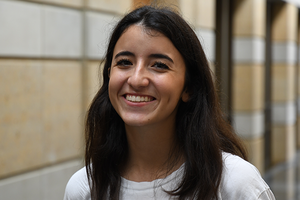
Miriam Bethencourt, a senior majoring in English and Peace Studies, was originally from Venezuela but grew up in Raleigh, North Carolina. Miriam’s background is what brought her to study peace as she was looking for ways to address violence and injustice seen in many repressive regimes. This summer, Miriam participated in She Leads Training spending half a month in Geneva with the UN Institute for Training and Research. In this Student Q&A, she reflects on this experience as well as her biggest learning points.
Why study peace?
I was born in Caracas, Venezuela, before I migrated to the United States with my family when I was five years old. Growing up with this background, I was acutely aware of the repercussions of violence and injustice. When I started college, I was looking for answers: how does violence like this happen? How do we fix it? Studying peace provided the unique answers I was looking for. I have learned that peace is not an idealistic, impossible goal; it's strategic, necessary, and important. Working for peace means working for the dignity of the human person at every level of society.
What is your experience at the Kroc Institute?
I am so thankful for what the Kroc Institute has been for me during my time here at Notre Dame. From the professors to the visiting scholars to guest speakers, every person at the Kroc has taught me something about the world and how to make it a better place. I've also been able to experience the global impact the Kroc has. Both in Israel-Palestine and Geneva, I've met Kroc graduates and affiliates working in the field or in international organizations. It's been amazing to see how these leaders for peace are so proud of the Kroc and where they came from, and the network they have built to support one another. I am proud to be learning from the same place they did.
Tell us more about the She Leads Training in Geneva.
Over the summer, I had the incredible opportunity to spend two weeks in Geneva attending the #SheLeads4Peace summer program at the UN Institute for Training and Research. The program combined practical training with personal skills development and emphasizing our unique and valuable role as women in the field. We met incredible professionals working now on the ground, at the UN, or in other institutions for humanitarian aid and development. Coming out of the program, I felt more confident as to what a career in peacebuilding could look like as well as my own value and ability to achieve my professional goals. Most of all, I now have a network of women in the field who have each taught me so much about what it means to be a peacebuilder and from whom I can continue learning in the years to come.
What do you want to do after graduation?
While I am still discovering what my dream professional path looks like, I am particularly interested in education as a tool for peacebuilding. In the coming years, I hope to work on the ground as a peace practitioner and educator, before pursuing graduate studies in peace and conflict resolution.
Where would you place yourself on the Strategic Peacebuilding Wheel?
I would place myself between Education and Dialogue/Conflict Resolution Strategies. I am particularly interested in how conflict impacts and is impacted by early childhood and adolescent education and what kinds of spaces we create for dialogue and connection for youth.
Any fun facts about you?
I enjoy creative writing and have been known to share poems every now and then. I am the youngest of nine, which means I now have plenty of nieces and nephews whom I unbiasedly adore. I love to travel and recently studied abroad in Israel-Palestine!